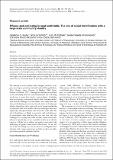Files in this item
Efficacy and well-being in rural north India : the role of social identification with a large-scale community identity
Item metadata
| dc.contributor.author | Khan, Sammyh | |
| dc.contributor.author | Hopkins, Nick | |
| dc.contributor.author | Tewari, Shruti | |
| dc.contributor.author | Srinivasan, Narayanan | |
| dc.contributor.author | Reicher, Stephen David | |
| dc.contributor.author | Ozakinci, Gozde | |
| dc.date.accessioned | 2015-02-17T14:31:03Z | |
| dc.date.available | 2015-02-17T14:31:03Z | |
| dc.date.issued | 2014 | |
| dc.identifier | 132797223 | |
| dc.identifier | c0e17649-ae4a-42b3-819f-eac2c2ed4d5c | |
| dc.identifier | 000346557400015 | |
| dc.identifier | 84919383895 | |
| dc.identifier.citation | Khan , S , Hopkins , N , Tewari , S , Srinivasan , N , Reicher , S D & Ozakinci , G 2014 , ' Efficacy and well-being in rural north India : the role of social identification with a large-scale community identity ' , European Journal of Social Psychology , vol. 44 , no. 7 , pp. 787-798 . https://doi.org/10.1002/ejsp.2060 | en |
| dc.identifier.issn | 0046-2772 | |
| dc.identifier.other | ORCID: /0000-0001-5869-3274/work/27163479 | |
| dc.identifier.uri | https://hdl.handle.net/10023/6115 | |
| dc.description | ESRC research grant. Grant Number: RES-062-23-1449 | en |
| dc.description.abstract | Identifying with a group can contribute to a sense of well-being. The mechanisms involved are diverse: social identification with a group can impact individuals' beliefs about issues such as their connections with others, the availability of social support, the meaningfulness of existence, and the continuity of their identity. Yet, there seems to be a common theme to these mechanisms: identification with a group encourages the belief that one can cope with the stressors one faces (which is associated with better well-being). Our research investigated the relationship between identification, beliefs about coping, and well-being in a survey (N = 792) administered in rural North India. Using structural equation modelling, we found that social identification as a Hindu had positive and indirect associations with three measures of well-being through the belief that one can cope with everyday stressors. We also found residual associations between participants' social identification as a Hindu and two measures of well-being in which higher identification was associated with poorer well-being. We discuss these findings and their implication for understanding the relationship between social identification (especially with large-scale group memberships) and well-being. We also discuss the application of social psychological theory developed in the urban West to rural north India. | |
| dc.format.extent | 12 | |
| dc.format.extent | 221821 | |
| dc.language.iso | eng | |
| dc.relation.ispartof | European Journal of Social Psychology | en |
| dc.subject | Social identification | en |
| dc.subject | Social cure | en |
| dc.subject | Self-efficacy | en |
| dc.subject | Well-being | en |
| dc.subject | North India | en |
| dc.subject | BF Psychology | en |
| dc.subject.lcc | BF | en |
| dc.title | Efficacy and well-being in rural north India : the role of social identification with a large-scale community identity | en |
| dc.type | Journal article | en |
| dc.contributor.sponsor | Economic & Social Research Council | en |
| dc.contributor.institution | University of St Andrews. School of Psychology and Neuroscience | en |
| dc.contributor.institution | University of St Andrews. St Andrews Sustainability Institute | en |
| dc.contributor.institution | University of St Andrews. School of Medicine | en |
| dc.contributor.institution | University of St Andrews. Health Psychology | en |
| dc.identifier.doi | 10.1002/ejsp.2060 | |
| dc.description.status | Peer reviewed | en |
| dc.identifier.url | http://onlinelibrary.wiley.com/doi/10.1002/ejsp.2060/suppinfo | en |
| dc.identifier.grantnumber | RES-062-23-1449 | en |
This item appears in the following Collection(s)
Items in the St Andrews Research Repository are protected by copyright, with all rights reserved, unless otherwise indicated.

